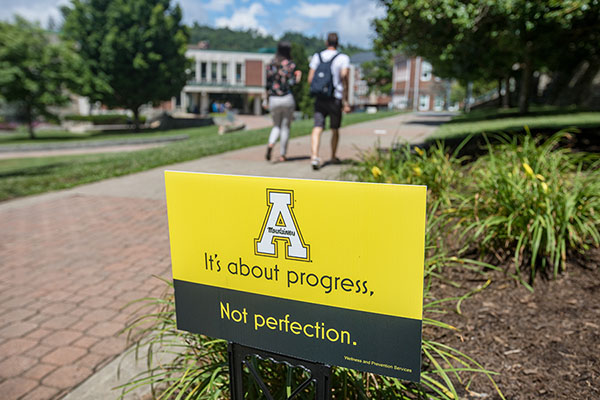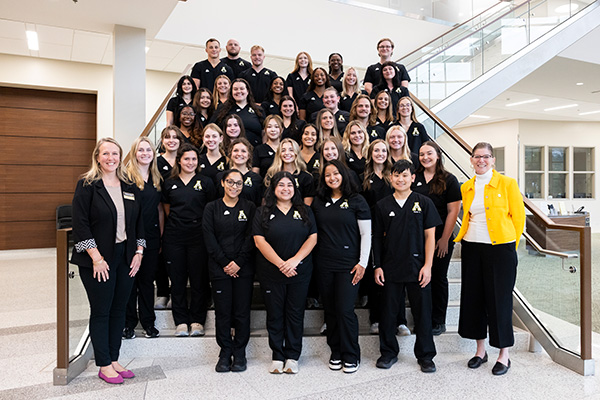BOONE, N.C. — Plans are underway to more than double the capacity of the Child Development Center (CDC) at Appalachian State University, which serves the university’s faculty, staff and students.
Currently, the center serves 68 children and the expansion will bring the total to 168. Beyond the number of families served, the expansion will address several needs that are not being met by the existing program.
Chancellor Sheri Everts said the university recognizes the importance of child care in recruiting and retaining highly qualified faculty, staff and students, and for allowing students to continue their education as they raise and expand their families.
“Access to quality child care is a pressing need for students, staff and faculty,” Everts said. “Viable child care options factor heavily when our campus community considers issues around quality of life."
A recent assessment by Appalachian’s Wellness and Prevention Services indicated an increasing number of students have dependents and need additional support, such as child care options, to thrive at Appalachian and have a greater chance of finishing their degrees (see related article).
The current facility is located on Poplar Grove Road in Boone. At its December 2018 meeting, Appalachian’s Board of Trustees approved the selection of a design firm to conduct a project feasibility study, which is expected to be complete in May.
“We’re looking at how we can either build a new building on that site or renovate and expand the existing facility,” said Matt Dull ’05, Appalachian’s assistant vice chancellor for finance and operations.
Dull emphasized the high priority of the CDC expansion. He said, “We are moving forward as quickly as we can. Moriah Stegall, our new director of the CDC, joined our team and brings a lot of experience. We’re excited to have her on our design study group.”
High-quality and affordable child care
Stegall ’07 ’14 said there are 95 families on the current waitlist — 55 with children under 15 months old and 40 with children whose ages range from 1–3. Current capacity for the center’s infant unit is set to eight while the toddler unit (children under 2 years old) can accept up to 10 children.
She said, “I get three or four parents’ calls or emails (looking for child care) each week.”
An increase in the proportion of infant and toddler spots is planned for the new center. “What we know about parents is that once they get a child enrolled in a center, they don’t want to move them because continuity of care is so important in the early years,” Stegall said.
Quality child care goes beyond taking care of the basic needs of the children, Stegall said. “We want to provide early care and enrichment, which is relationship-focused and child-centered. Our work is focused on how we are meeting each and every child’s myriad of developmental needs and helping each grow and develop as a person.
“We know what happens in the first three years of life sets the precedent — 85 percent of the brain’s neuropathways are formed by the third birthday. We want to provide the highest quality care and enrichment for the children of our faculty, staff and students,” she said.
Stegall said infant care is more expensive because one teacher is needed for every four infants, as compared to one teacher for 10 preschool-age children. To help keep child care affordable for parents, Stegall said federal funding, including the Head Start and Early Head Start programs, can be leveraged to cover some of the costs.
Dull said in addition to federal funding, parents pay fees for their children to attend CDC. “We do a sliding scale based on income, which helps accommodate our students and some of our staff members, making sure we have affordable child care for them,” he said.
Supporting student parents
The center is part of Appalachian’s Division of Student Affairs, with a mission to serve children of students first. Stegall said there are currently 17 children of students at the center and the rest are children of faculty and staff.
Though students are given priority on the CDC waitlist, Stegall explained spots aren’t always available when needed. “A faculty parent will call me when they’re six–eight weeks pregnant and get on the waitlist. Student parents often wait until two–three weeks prior to classes starting to ask about enrolling their children.”
Additionally, the center does not serve lunch, and Stegall said, for some student families, “it’s simply too much to pack a lunch for their child that meets the state’s nutrition standards on top of everything else.”
Stegall said a kitchen in the new center would meet this need. “If that’s one thing we can do to alleviate stress for parents, I’d like to do that,” she said.
Stegall said she is excited about the planned expansion providing quality early care on a larger scale. She said the feasibility study is the first step in providing a greater number of Appalachian students, faculty and staff access to high-quality, affordable child care.
Why 8 dimensions of wellness are important to students’ holistic balance
About Student Affairs at App State
Student Affairs at App State supports student success and well-being by fostering a culture of care, inclusion and engagement. Its mission is to develop lifelong learners and dynamic leaders through meaningful experiences that challenge and support students. Grounded in a commitment to care, engage and transform, Student Affairs creates a student-centered environment that encourages resilience, leadership, service and global learning. Student Affairs encompasses the following units: Campus Activities, Case Management, the Child Development Center, Community-Engaged Leadership, Counseling and Psychological Services, Office of the Dean of Students, New Mountaineer and Family Engagement, Off-Campus Student Services, Plemmons Student Union, Student Conduct, M.S. Shook Student Health Service, Student Legal Services, Student Veteran Services, University Recreation, and Wellness and Prevention Services. Learn more at https://studentaffairs.appstate.edu.
About Appalachian State University
As a premier public institution, Appalachian State University prepares students to lead purposeful lives. App State is one of 17 campuses in the University of North Carolina System, with a national reputation for innovative teaching and opening access to a high-quality, cost-effective education. The university enrolls more than 21,000 students, has a low student-to-faculty ratio and offers more than 150 undergraduate and 80 graduate majors at its Boone and Hickory campuses and through App State Online. Learn more at https://www.appstate.edu.
What do you think?
Share your feedback on this story.













